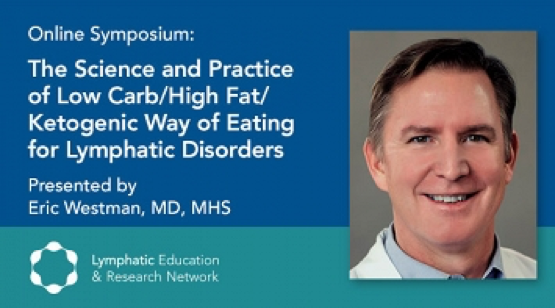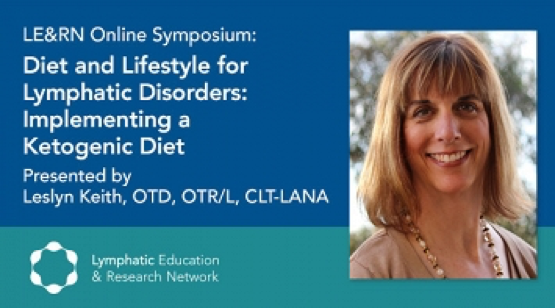The Ketogenic Diet

There is a great deal on evidence about the effect of obesity on lymphoedema. Those with lymphoedema often try and lose weight but don’t succeed for many reasons. Over the past few years the ketogenic diet has been gathering momentum as a possible diet for those with lymphoedema and lipoedema. Although further research in this population is required, lymphoedema practitioners need to understand what it is, how it works and the current evidence for assisting those with lymphoedema and lipoedema.
To begin your journey into understanding the ketogenic diet there are two free webinars available from the Lymphedema Education and Research Network (LE&RN) that may assist.
As our clients often have coexisting medical problems it is important to always remember to tell them it is essential to be medically supervised for any weight loss program, particularly if you are taking medications. Please consult your medical provider before drastically changing your diet.
It is also essential that all practitioners work within their scope of practice and refer to health professionals that are appropriately qualified.
The Science and Practice of Low Carb/High Fat/Ketogenic Way of Eating for Lymphatic Disorders
Presented by Eric Westman
Duration 58 minutes
This webinar includes the following topics:
- Is it safe to study low carbohydrate diets?
- Definition of what is a ketogenic diet.
- Foods you can eat on a ketogenic diet. Examples include:
- Eggs, bacon (or sugar –free yogurt with berry slices)
- Chicken Caesar salad (or fast food burger without the bun)
- Snack: olives, cheese stick (or pepperoni slices)
- Steak with bleu cheese, broccoli (or salmon with cream sauce)
- Drinks: water, sugar-free drinks, coffee w/cream
- The effect of the ketogenic diet on obesity. This diet leads to fat mass loss.
- The effect of the ketogenic diet on metabolic syndrome which is defined by elevated blood pressure, abdominal obesity, insulin resistance, elevated plasma glucose, and atherogenic dyslipidemia (elevated serum triglyceride and apolipoprotein B, increased small low-density lipoprotein particles and a reduced level of high-density lipoprotein cholesterol).
- The effect of the ketogenic diet on type 2 diabetes.
- Overview of the research behind the diet.
Diet and Lifestyle for Lymphatic Disorders: Implementing a Ketogenic Diet
Presented by Leslyn Keith Occupation Therapist
Duration 50 minutes
This webinar includes the following topics:
- What is the ketogenic diet? That is low carbohydrate, moderate protein and high fat. This diet does the following:
- Changes the primary fuel source to fat. Adipose tissue stores our preferred fuel source.
- Meaningful weight loss without muscle loss.
- A list of common diseases positively impacted by the ketogenic diet including:
- Epilepsy
- Cancer
- Hyperlipidemia
- Cardiovascular disease
- Type 2 diabetes
- Weight loss
- Neurological conditions
- Lymphatic diseases
- Leslyn outlines the ketogenic diet research she undertook with 12 of her lymphoedema clients. Her hypothesis was that weight loss using a ketogenic diet will significantly impact lymphoedema and quality of life. Her research questions were:
- Will weight loss impact lymphoedema in individuals with obesity?
- Can a low carbohydrate ketogenic diet improve quality of life in individuals with lymphoedema and obesity?
- Will lifestyle and dietary change be best supported in a group treatment model?
- The study sample size was small. In this webinar demographic information on the subject population or detailed methodology was not provided. She found the results showed significant improvement in the outcome measures which includes weight, BMI, waistline circumference, limb volume and quality of life. Future research should include a larger sample size.
- A clinical trial is being designed to look at the effect of the ketogenic diet on lipoedema.
- A number of case studies were presented that considered the ketogenic diet and lymphatic health.
- Useful resources are provided as well as a reference list.

The Keto Diet for Beginners
Both presenters listed www.dietdoctor.com/low-carb/keto as a useful website.
It provides easy to understand information. Topics include:
- Introduction: What is ketosis?
- What to eat on a keto diet. Including menu plans and recipes.
- Why eat keto – the benefits.
- How to know you’re in ketosis.
- How to reach optimal ketosis.
- Keto tips and guides.
- Potential side effects of ketosis.
- Keto Q&A, troubleshooting and resources.




